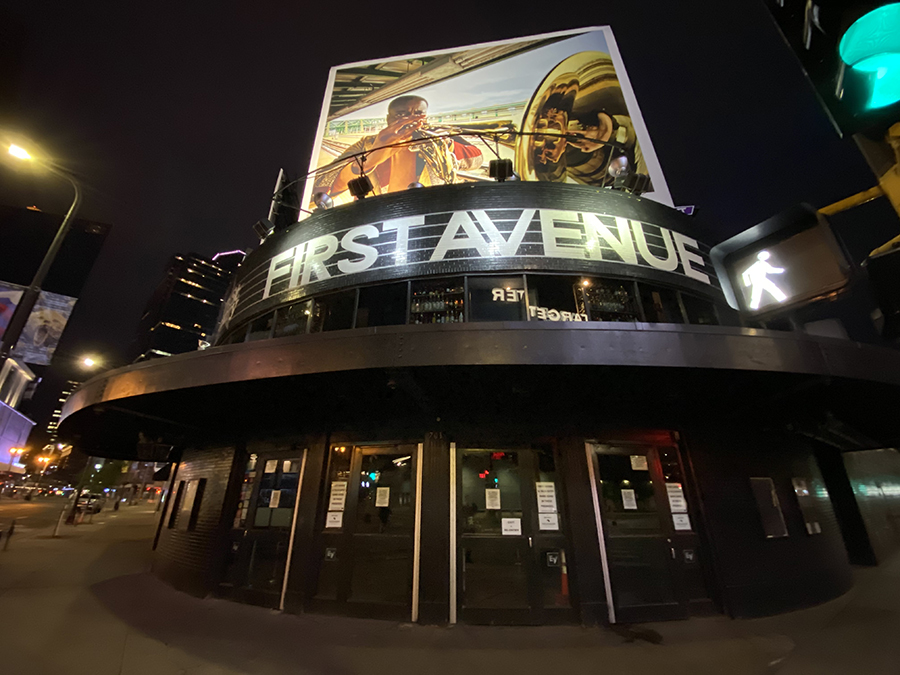COVID relief to include $15B for music venues: The specifics

First Avenue in Minneapolis photographed on May 19, 2020. Photo: Todd Johnson.
While most headlines about the newly-passed, long-awaited second round of COVID relief are focused on the $600 individual payments, it also includes help for the nation’s independent venues.
According to a joint statement by Nancy Pelosi and Chuck Schumer, the bill “includes $15 billion in dedicated funding for live venues, independent movie theaters, and cultural institutions” through the inclusion of the Save Our Stages Act.
RIFF has obtained a draft of the 5,593-page bill text.
The recovery bill covers live venue operators or promoters, theatrical producers, live performing arts organizations, museum operators, motion picture theater operators, or talent representatives that represent these groups.
“An eligible person or entity applying for a grant under this section shall submit a good faith certification that the uncertainty of current economic conditions makes necessary the grant to support the ongoing operations of the eligible person or entity,” the bill states. This means the applicants need to sign documents that affirm that a business has been severely stricken by the pandemic shutdown.
The first round of grants, during a 14-day window, would go to eligible organizations that can demonstrate that their revenue from April 1 to Dec. 31 was 10 percent or less of their revenue from the same period of time in 2019.
Up to 80 percent of the $15 billion would go to those two groups, if approved.
After those 28 days, the remainder of the funds would become open to other organizations.
There’s a limit of five entities for any one person or company that can claim this grant. So if you own 10 venues nationwide, you can only get grants for five of them.
Also, $2 billion is specifically earmarked for companies with 50 or fewer full-time employees.
In total, including the 28-day priority period, there’s a 60-day window for grant filings.
As of April 1, 2021, a venue can demonstrate that it has 30 percent or less the revenue as the corresponding calendar year earlier, it may be eligible for supplemental grants.
If a venue was in operation on Jan. 1, 2019, it can claim an amount equal to 45 percent of its gross revenue during 2019. If it opened in 2019 it can claim six times its average monthly gross in 2019, or $10 million.
The April 1, 2021 supplemental grant can be up to 50 percent of the first grant, with a maximum amount of $10 million. Grant money must be used for costs incurred from March 1, 2020 to Dec. 31, 2021. Supplemental money is for costs from March 1, 2020 to June 30 to 2022. Unspent funds must be paid back after a year. The money can be used for mortgage or rent, utilities, payroll and other employee costs, loan payments, maintenance, administrative costs, taxes, insurance, and advertising. No one contractor can be paid more than $100,000.
The funds cannot be used to buy real estate, make payments on loans originated after Feb. 15, 2020, invest or re-lend, or make political donations.
“We’re thrilled that Congress has heard the call of shuttered independent venues across the country and provided us a crucial lifeline by including the Save Our Stages Act in the COVID-19 Relief Bill,” said National Independent Venue Association president Dayna Frank, the CEO of First Avenue in Minneapolis. “We’re also incredibly grateful that this bill provides Pandemic Unemployment Assistance which will help the millions of people who lost their jobs through no fault of their own during this economic crisis.”
NIVA was founded in April in response to the risk faced by a prolonged shutdown due to the pandemic. It led the effort known as “Save Our Stages,” known by several other names, and has worked to keep the needs of the music industry in the spotlight. The shutdown has come to pass, and many venues have shuttered as a result, but the lobbying and fundraising efforts of NIVA and other groups have helped to limit the damage. This additional aid, expected to be passed by Congress and signed into law by the end of the year, will further ensure there are still concert venues when it’s safe to gather in groups again.
Editor Roman Gokhman contributed to this report. Follow editor Daniel J. Willis at Twitter.com/BayAreaData.
